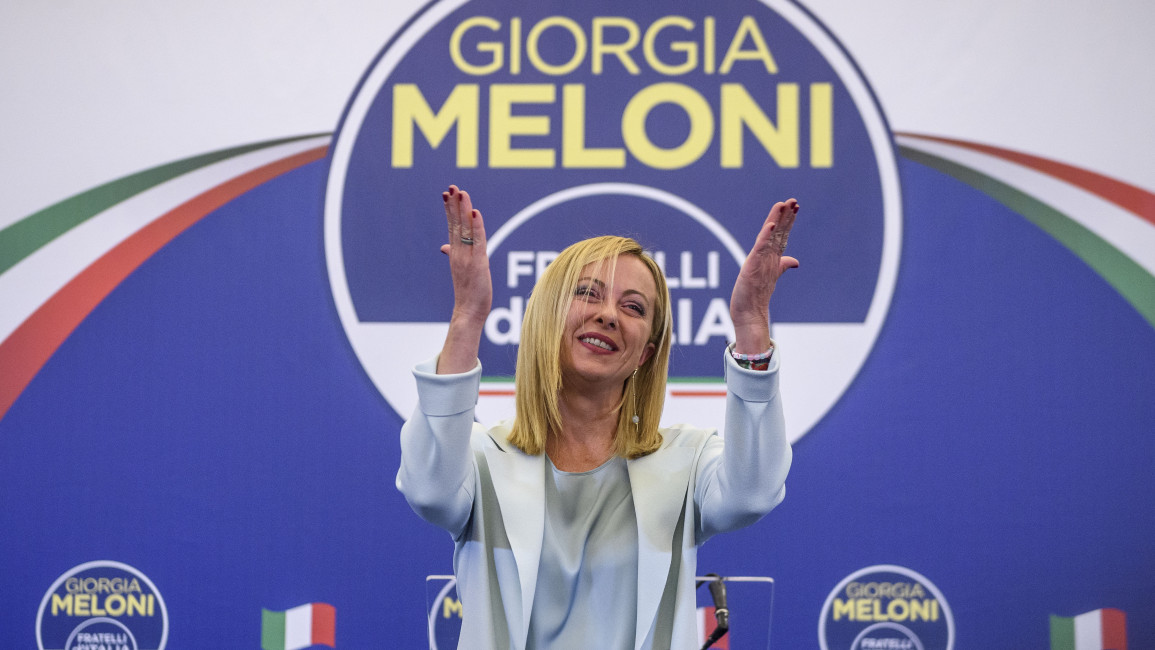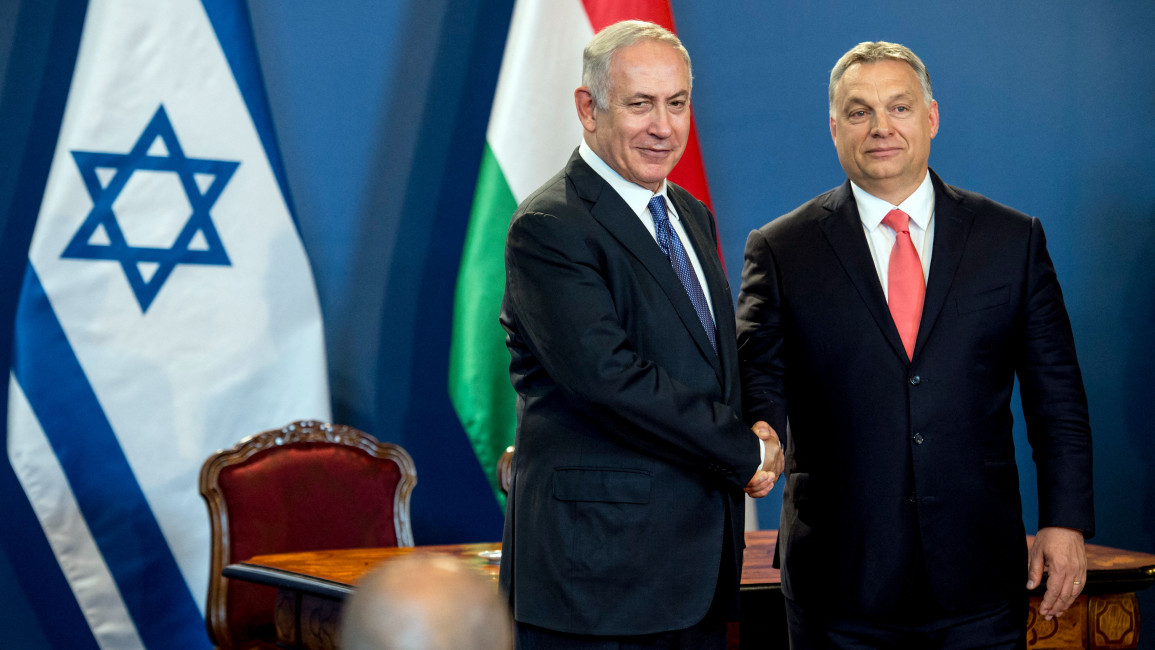
What Giorgia Meloni's victory could mean for the Middle East

It was no surprise when far-right nationalists, Islamophobes, and Eurosceptics from Hungary’s Viktor Orban to France’s Marine Le Pen and Spain’s Santiago Abascal immediately congratulated Giorgia Meloni after her electoral victory last month.
An alliance comprised of Meloni’s Fratelli d’Italia, Matteo Salvini’s Lega, and Silvio Berlusconi’s Forza Italia will control Italy’s Senate and the Chamber of Deputies.
Consequently, Italy will have its most-right wing government since Benito Mussolini’s fall 79 years ago.
"With migration central to Meloni's political agenda, her government will have a security-first policy toward the Mediterranean"
Since Meloni’s win, many analysts have been busy discussing her expected confrontations with institutions in Brussels, the road ahead for minority groups in Italy, the future of Italian democracy, as well as Meloni’s stances on Russia, Ukraine, and NATO.
Although these discussions are important, it is also critical to ask what Meloni’s victory means for Rome’s foreign policy in the Arab world.
During Meloni’s campaign, she did not focus much on policies toward the Middle East and North Africa. Therefore, one must be cautious when making any predictions about how Italy’s foreign policy in the Arab region will change with Meloni at the helm. Nonetheless, it seems safe to make several assumptions.
North Africa
With migration central to Meloni’s political agenda, her government will have a security-first policy toward the Mediterranean. Also, Meloni’s government will need to focus heavily on energy-related issues vis-à-vis the Maghreb, especially Algeria.
Meloni being at the helm could have serious implications for Italy’s relationships with North African states.
She is determined to block migration, especially from African countries, and has gone as far as advocating a naval blockade. Although this talk effectively mobilises a xenophobic base, implementing such a policy once in power is something else.
“In the previous years, former Interior Minister Matteo Salvini made a similar restrictive policy, but eventually faced a number of legal and political issues, thus compromising the relations between Rome and Brussels. Despite populist ideology, it is not that easy to halt completely migratory flows,” explained Mauro Primavera, a researcher at the Oasis International Foundation, in an interview with The New Arab.
“Probably, Meloni’s approach will be more subtle than Salvini’s. She will try to sign treaties with North African countries, namely Tunisia and Libya, in order to reduce as much as possible migrant routes that cross the Channel of Sicily. However, it will be difficult for Rome to negotiate with these states.”
|
|
Given Libya’s complicated security and political landscape, “negotiating new agreements with the Libyan leadership would certainly be extremely complicated right now, given that the country is once again divided among different authorities,” said Lorena Stella Martini, advocacy and communications assistant at the European Council on Foreign Relations, told TNA.
“It would be difficult for Meloni to sustain a deeper cooperation with Libya on migration in the current conditions, even from a practical point of view.”
Italy’s approach to Libya in recent several months has been a “wait-and-see” one. “The next government will probably avoid supporting one of the Libyan parties too openly, leaving more room for multilateral dialogue,” Francesco Petronella, a journalist and geopolitical analyst at the Rome-based Treccani Institute, told TNA.
“The previous government, in fact, invested a lot in the figure of Abdulhamid Dbeibah, with not exactly excellent results. This, however, does not mean that Italy can afford to neglect Libya, which remains the centre of its geopolitical action in the Mediterranean both in terms of energy and immigration.”
In Tunisia, President Kais Saied might be willing to play ball with Italy’s new government on the migration file. But the strongman in Tunis would probably only do so in exchange for concessions from Rome, which could involve trade and investment deals and counterterrorism support.
"Meloni's foreign policy might make Rome more supportive of Israel and push Italy towards normalising with Bashar al-Assad's government"
Meloni and her allies know that a naval blockade against migrants is not viable. Therefore, as Petronella told TNA, the real goal of Meloni and her party members is “to bolster the European naval missions already operating in the Mediterranean, such as [the European Union Naval Force Mediterranean Operation IRINI], and to strengthen the agreements with the North African governments for the control of migratory fluxes”.
He added that Italy’s far right has “neither the intention nor the capacity to face south-Mediterranean issues; hence, it will focus on the simplest aspect: containing human flows”.
With Meloni and her allies in Rome focusing so much on migration-related issues in relation to the Maghreb, there is “the risk, which needs to be averted for the interests of all parties involved, that the new [Italian] leadership reads the Mediterranean basin primarily as a source of security threats - namely migration - rather than as a source of mutual opportunities and interests in several sectors,” warned Martini.
“This might motivate a will to put up walls instead of building bridges across the Mediterranean. Such an approach would not be wise or beneficial, as it does not take into account the interconnected interests shared by both banks of the Mediterranean basin.”
The Levant
Meloni’s foreign policy might make Rome more supportive of Israel and push Italy toward normalising with Bashar al-Assad’s government.
Viewing not only Islamists but Muslims in general as a threat, Fratelli d’Italia maintains “the right to defend and promote classical and Judeo-Christian historical and cultural roots” as “an important ideological premise that aims to improve relations between the Italian far right and Jewish communities and Israel,” explained Primavera.
Consequently, the Israeli right “favours the rise of [Meloni] - just as they did with Trump, Salvini, and Bolsonaro - and do not give too much importance to [her] neo-fascist positions”.
Indeed, on one level there is an irony to Israelis being enthusiastic about an Italian politician with neo-fascist roots coming to power.
“When she makes public references to Jews as financial speculators who need to be controlled, you know who used to say that? Mussolini said that. Very often she makes direct reference to what Mussolini used to say,” pointed out foreign policy analyst Rula Jebreal in an interview with The New Arab.
|
|
Yet, when viewed within the context of Israel’s right-wing leadership seeing Orban and other right-wing nationalists in Europe who peddle anti-Semitic tropes as Tel Aviv’s best friends in the EU, former Prime Minister Benjamin Netanyahu’s son, Yair, being so quick to congratulate Meloni after her victory last month was no surprise.
Petronella predicts that Meloni will likely lead the most pro-Israeli government in Italian history.
“Fratelli d'Italia is the heir party of the Italian post-fascist right, but this political area has abandoned any anti-Semitic position a long time ago. Today, the party supports Israel's right to existence and security, while the only political actors to remain pro-Palestinian in Italy are small groups of the radical left. Matteo Salvini, leader of the second party of the Italian right, even said that Italy could transfer its embassy from Tel Aviv to Jerusalem, as Donald Trump did in 2017 with the US embassy.”
"I would not be surprised if in the near future they would support Assad not only with words, but with something else"
In 2018, Meloni created some controversy by crediting Assad’s regime and Lebanese Hezbollah with saving religious minorities in Syria. Jebreal expects Italy’s new government to pursue a rapprochement with Damascus. “Meloni endorsed Assad while he was slaughtering Syrians…by stating that he is defending Christians,” she explained.
“I would not be surprised if in the near future they would support Assad not only with words, but with something else,” said Jebreal in a response to a question about what types of ways Meloni and her far-right allies in Italy and other European countries might approach Bashar al-Assad.
“It is worth remembering that in the past Meloni has expressed support for the regime of Bashar al-Assad in Syria, considered ‘the only protector of Christian minorities’ against the radical Islam of Daesh and other Sunni groups,” observed Petronella.
“Salvini was even more explicit in his support for Assad, even relaunching Russian and [Syrian] regime propaganda on his social media accounts and spreading doubts about human rights violations committed by the Damascus government against the people of Syria.”
The Gulf
When discussing the future of Rome’s relations with Gulf Cooperation Council members, some Italian foreign policy experts expect Meloni’s government to view these resource-wealthy Gulf Arab states as valuable economic, investment, trade, and security partners.
“It's too early to make predictions, but it’s possible that Meloni will sign Trump-like deals with Gulf countries in [domains] of energy, weapons, and technology,” said Primavera.
It is important to keep in mind that certain right-wing Italians like Giovanbattista Fazzolari and Salvini have previously accused the Qataris of advancing an Islamic extremist agenda in Italy through the financing of mosques and Islamic cultural centres.
Whether these accusations made in the past impact how Meloni’s government engages Doha, which is a major investor in the Italian economy and has a strong military partnership with Rome, remains to be seen.
It’s safe to assume that Meloni’s government will probably deal with Doha on highly transactional terms, whereas with Abu Dhabi and Riyadh there could be some real ideological synergies rooted in some common causes.
"Some Italian foreign policy experts expect Meloni's government to view these resource-wealthy Gulf Arab states as valuable economic, investment, trade, and security partners"
“I testified in the European Parliament in May about how the UAE and Saudi Arabia have been financing [Europe’s] far-right movements…I don’t know about Meloni, but I believe they’ve been financing all kinds of initiatives in Europe, Italy too, that will prop up that kind of rhetoric,” explained Jebreal.
Yet even if Meloni and her supporters find the UAE, Saudi Arabia, and Assad’s Syria as the type of states which Italy should partner with closely, Jebreal doesn’t believe that Italy’s new leadership will necessarily view all GCC states so positively.
“I think Meloni and her neo-Fascist party see governments like Qatar, Oman, and Kuwait as threats due to their belief in more inclusive, tolerant, diverse and multicultural societies, commitment to smart diplomacy, and investments in the next generation via educational projects while building bridges with diverse communities across the world.”
Giorgio Cafiero is the CEO of Gulf State Analytics.
Follow him on Twitter: @GiorgioCafiero




